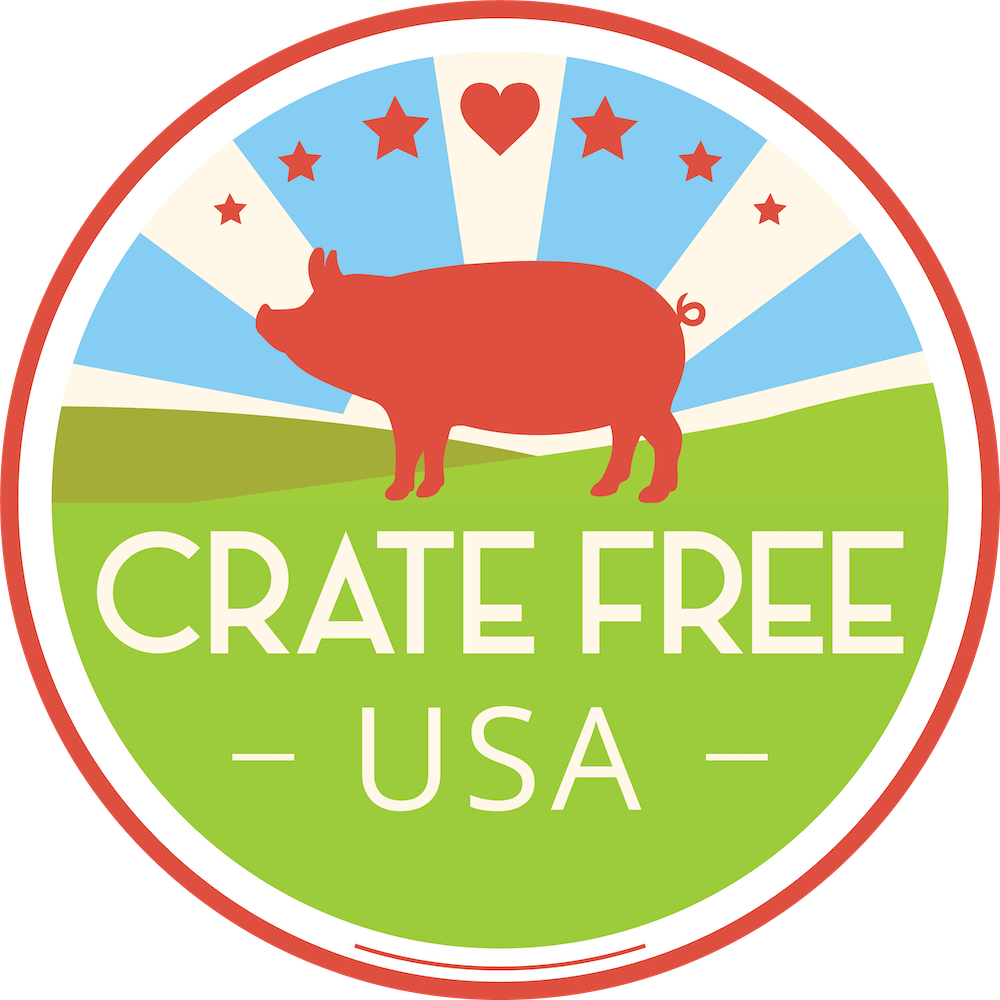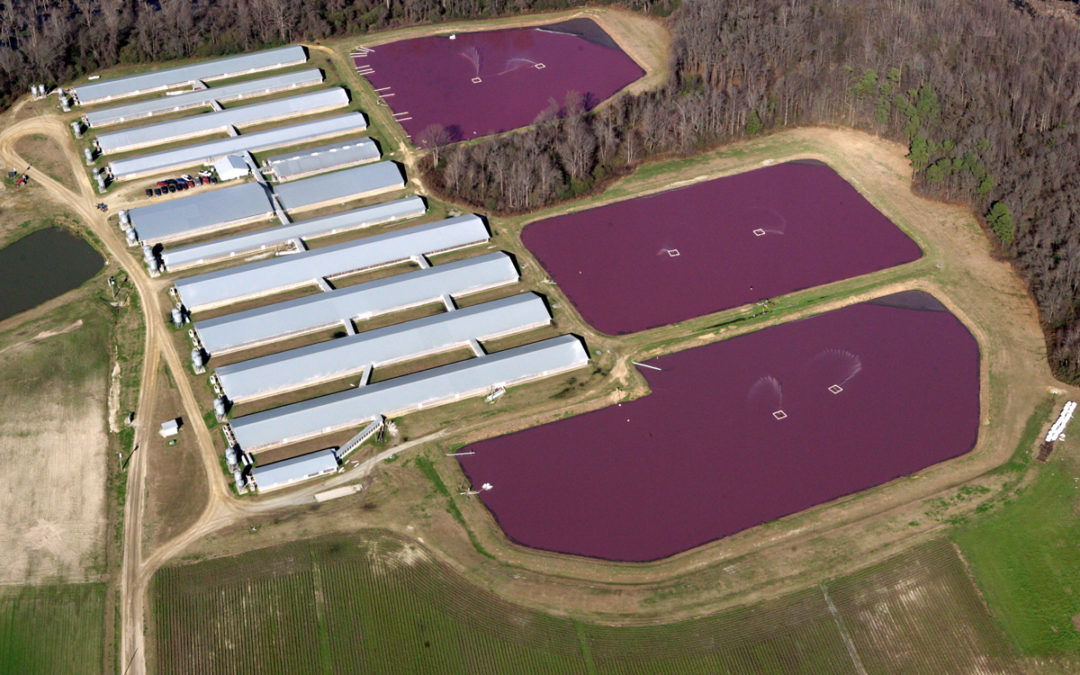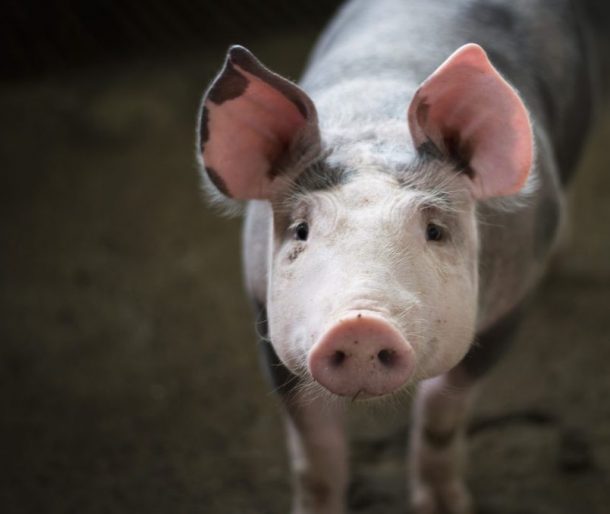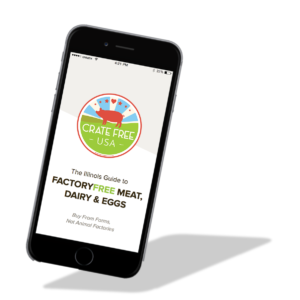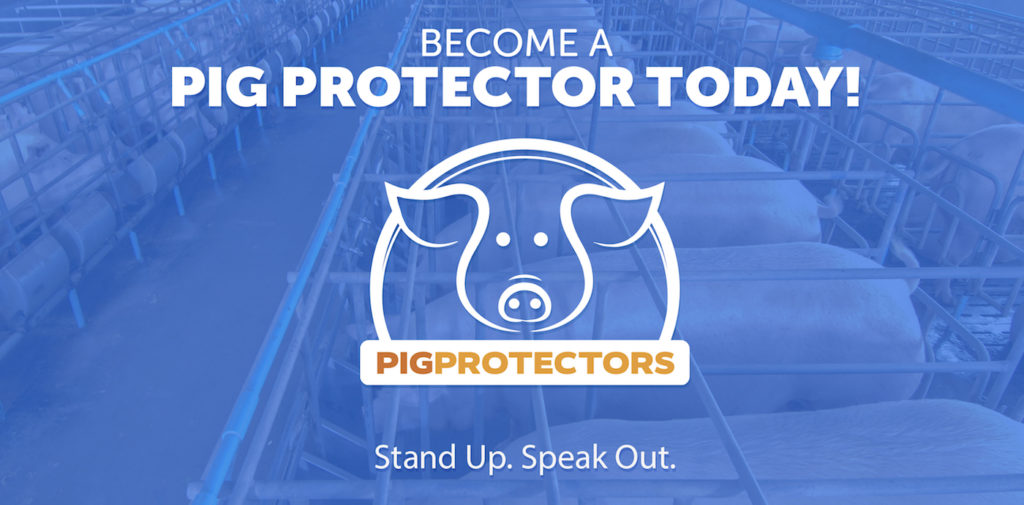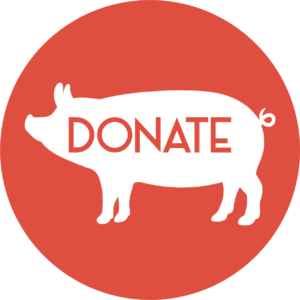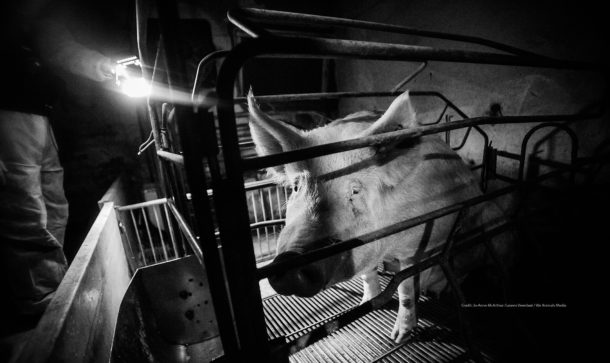North Carolina hog farm. (Photo: Rick Dove, Waterkeeper Alliance)
In the U.S. alone, 9 billion animals are raised and slaughtered each year for humans to eat (much of it still going to waste). It is a gargantuan industry that puts an enormous strain on our natural resources — on the land, the water, and in the air. Not only are animals raised in overcrowded, inhumane conditions, these factories are polluting our environment and cause many public health concerns.
Over the last 40 years we’ve shifted away from smaller, independent farms to fewer enormous animal factories that raise thousands of animals in one place. It was only in the 1970s that this shift began and is still why many don’t realize where their cheap meat comes from today.
Read more about our campaign asking Aldi to stop using gestation crates for pigs.
Factory farms are not only overcrowded places where animals can’t exhibit innate behaviors, they are huge polluters of the environment. These factories produce a tremendous amount of waste. In the U.S. alone, animals raised on factory farms generate more than 1 million tons of manure per day — three times the amount generated by the country’s human population. Factory farms typically store animal waste in huge, open-air lagoons, often as big as several football fields, which are prone to leaks and spills.
Illinois itself is the fourth largest pork producer in the United States and in 2009, an Illinois hog farm spilled 200,000 gallons of manure into a creek, killing more than 110,000 fish. The Chicago Tribune found that pollution incidents from hog confinements killed nearly half a million fish from 2005 through 2014. Pig waste polluted about 70 miles of the state’s rivers, creeks and waterways over that time.
The demand for open pastures for livestock major driver of deforestation. In fact, cattle ranching is the leading cause of deforestation in Brazil, causing 80 percent of the Amazon destruction, with the U.S. being a large importer of Brazilian Beef. This has been in the news very recently with the Brazilian rainforest fires mostly set by ranchers to clear land for beef cattle.
Thoughts from Mike Nowak
On the blog today, we have an opinion piece from our friend and media partner, Mike Nowak.
For more than 20 years, Mike has been talking about gardening, the environment and green living on Chicago radio. He also co-hosted, Dig In Chicago, a local gardening and food TV program. For 16 years, he was an award-winning columnist on the inside back page of Chicagoland Gardening Magazine. In 2014, Around the Block Press published his first book, Attack of the Killer Asparagus and Other Lessons Not Learned in the Garden.
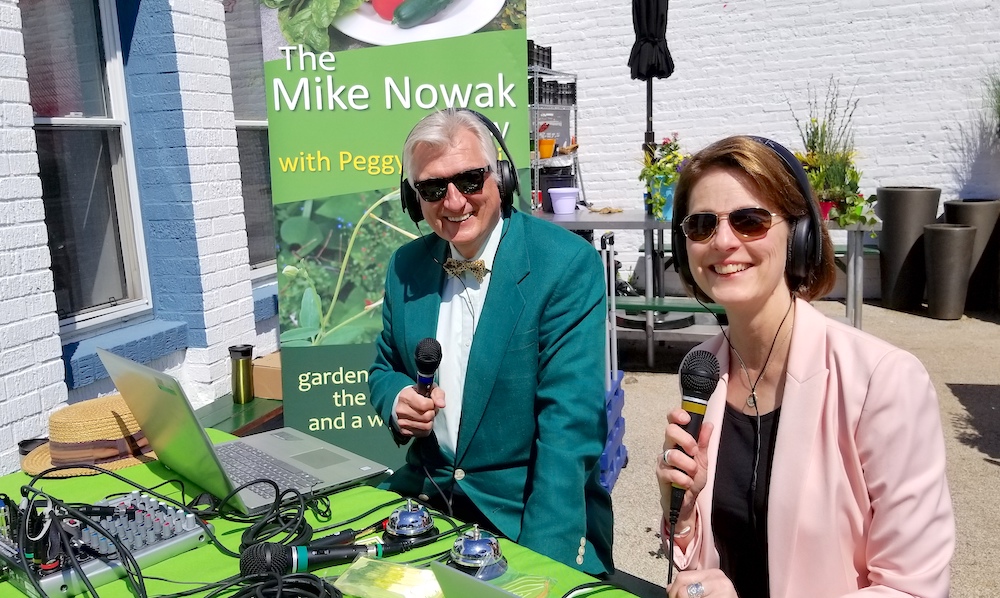
The Mike Nowak Show with Peggy Malecki – City Grange Broadcast
Mike often says that his background in gardening is show business, which is pretty close to the truth. He started on the Chicago stage, where he garnered awards for acting, directing and writing, even co-authoring a play that was produced off-Broadway and around the country. He has also received awards for radio production.
Here’s Mike’s take on our current environmental crisis.
Mike Nowak on the Environmental Effects of Factory Farming
Let’s face it. I’m a city guy. Always have been, probably always will be.
But that doesn’t mean I don’t notice wild and tame life around me. From my beloved La Gata (translation: “The Cat”), to the squirrels who dig up my yard looking for acorns and my spring blooming bulbs, to the birds (most of which I cannot identify) that seem to feel comfortable in the planned chaos of my garden, to the coyotes that I know are in the neighborhood but which I never see, to the spiders that I love, but unconsciously duck away from, I am aware that these creatures have carved out existences — some comfortable, some tenuous—alongside thuggish human beings.
When I describe our species as “thuggish,” I mean that too many of us think that we own the joint. That we can clear-cut, bulldoze, drain, pave-over and irrevocably alter the planet with impunity, displacing plants, animals — even lakes and mountains — and pay no price.
That’s absurd, of course. Humans like to think of themselves — because they can write poetry and worship their many gods and create cat videos — as the highest form of life on this lonely blue speck in an incomprehensibly vast universe.
Except they don’t act like it.
An intelligent life-form, for instance, would not have caused the Sixth Mass Extinction, which is ongoing even as I write and you read this. An intelligent life-form wouldn’t foul its own nest by pumping billions of tons of carbon into the atmosphere each year, leading to what will soon be runaway climate change, unless we make drastic changes very soon (It’s probably already too late but, like mom, I’m trying to make everybody happy).
And an intelligent life-form would not feed itself by causing suffering to other sentient beings, including, but not limited to, cattle, chickens and pigs. In other words, an intelligent life-form would not practice factory farming.
Yet here we are.
Wouldn’t it be nice if we could control our own procreation, meaning the out-of-control uptick in worldwide population? We are closing in on eight billion, which will quickly become nine. Are those sustainable numbers? Who knows? Does quality of life figure into the equation? And degradation of the earth? Or, when we say “sustainable,” are we talking about simple—and probably ugly—survival?
Consequently, conventional wisdom (or is it capitalism? I keep getting those concepts confused) tells us that raising animals by the thousands and sometimes tens of thousands in confined areas before they are slaughtered is the only way to feed our continually growing numbers.
Maybe we’re just talking about the “freedom” to eat a hamburger every day. Been there, done that. Moved on.
I have been hosting a radio show in Chicago for more than twenty years. It started as a gardening program. Seems pretty benign, doesn’t it? But here’s the problem with trying to report accurately on horticulture. Science is involved. And the science in gardening is connected to science in agriculture. Which is connected to science in raising and consuming animals. Which is connected to the science of assessing the consequences of raising and consuming massive numbers of animals in limited spaces. Which is connected to the science of climate change.
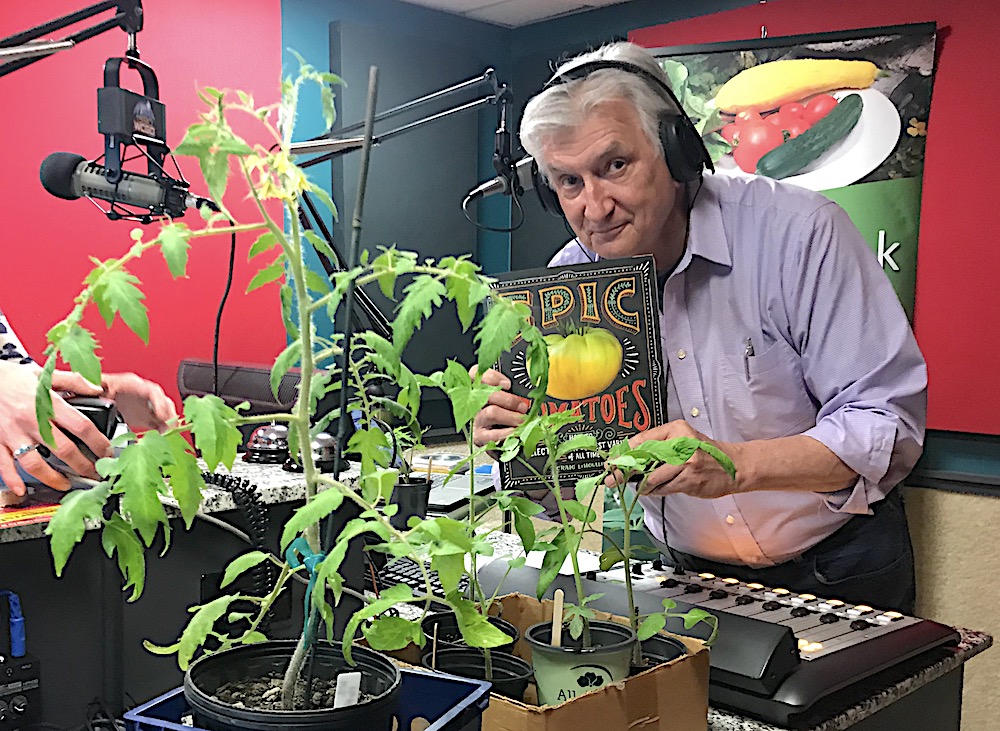
Mike Nowak on the air, and behind the tomato plant. Courtesy: Mike Nowak
Pretty soon, you’re talking to farmers and people in necessary organizations like Crate Free USA and Illinois Citizens for Clean Air & Water and The Humane Society of the United States and Farm Aid, and courageous people like Jessica Chipkin, John Ikerd, Chris Petersen and Karen Hudson, and you begin to realize how seriously flawed and cruel and dangerous to our planet our system of meat production is (I’ll leave the flaws of plant production for another day).
I’m not going to inundate you with facts about the harm caused by factory farms. But it’s hard to make an argument without at least a few tidbits of reality. The Chicago Tribune, in a remarkable series of stories in 2016 (“The Price of Pork”), reported that “pollution incidents from hog confinements killed at least 492,000 fish from 2005 through 2014,” and “pig waste impaired 67 miles of the state’s rivers, creeks and waterways over that time.”
I have interviewed people whose health became compromised when factory farms moved into their communities. I have talked to people who have put their careers, their families and their very lives in danger by speaking out against Big Ag and Big Meat.
I know people who have seen their property values plummet as factory farms move into their areas.
I have watched the State of Illinois disenfranchise ordinary citizens and run roughshod over county governments in favor of the business interests of factory farms.
And, sadly, that doesn’t begin to describe the horrors that CAFOs and related operations represent to our world.
When we use gestation crates, overuse antibiotics, raise animals in unspeakable conditions (that we sometimes read about by accident, recoil from in horror and move on to something less disturbing), we have opted to check our humanity, the very thing that is supposed to separate us from those animals, at the door. We have decided to become a less-than-intelligent-life-form.
Let me be clear. You’re not personally responsible for every animal that is mistreated, every bad decision made in a moment of avarice or ignorance or weakness. But it would be helpful if we could all move in the right direction, even a little bit at a time.
If you want to bust me for being an omnivore, knock yourself out. We’re all products of our culture. I’m not going to break my arm patting myself on the back, but I eat much less meat than I did twenty years ago. I now vet it more carefully. And I continue to get better at it. That’s what I’ve learned from the smart, concerned people represented by this website and many more. And I have now made it part of my mission to spread the word of their missions.
Nobody owns the joint — that is to say, planet earth. The joint is the joint. It will survive — probably thrive — without us. We’re just along for the ride. We need to get better at making the ride better — for us and for all of the critters with which we’re sharing the back seat.
Listen to The Mike Nowak Show with Peggy Malecki Sunday mornings from 9:00 AM-11:00 AM on WCGO Radio, 1590 and 95.5. Podcasts at mikenowak.net.
About the Author: Lisa Lubin is an Emmy-award winning video consultant, producer, writer and photographer. She’s a life-long animal lover from New Jersey who’s been living in Chicago for 20+ years. Lisa has also volunteered at PAWS and Feline Friends Chicago as a cat foster. She joined the Crate Free USA team in August 2016 and is now the executive director, website editor, and volunteer coordinator.
